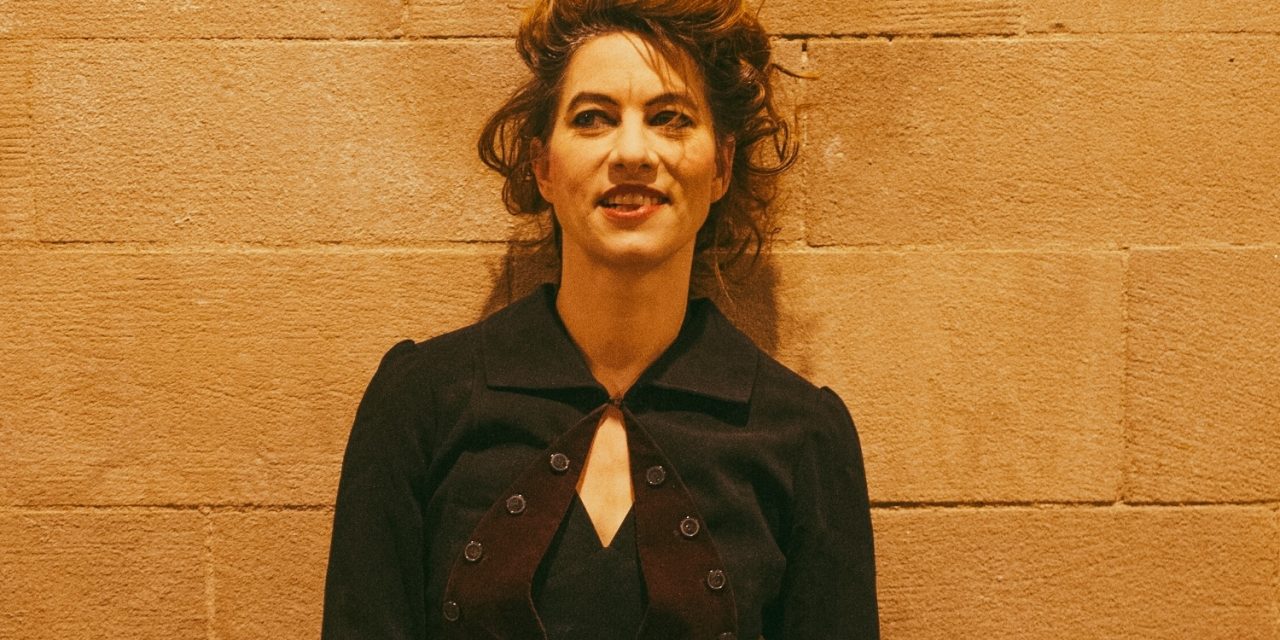 By Joey Odorisio
By Joey Odorisio
I first interviewed Amanda Palmer for FMQB back in 2004, when she was promoting her band The Dresden Dolls’ single “Coin-Operated Boy” from their eponymous debut album. Nearly 15 years later, I had the opportunity to chat with Palmer again for our fifth interview overall. To say a lot has happened in her life over that decade-and-a-half is an understatement.
Palmer recently released her third studio solo album, There Will Be No Intermission, which tackles a myriad of major life-changing events, from the death of her best friend from cancer to life as a mother of her young son.
We sat down to talk about the new record, empathy, abortion and much more before her performance in Philadelphia last month. She also recorded two acoustic songs, which you can hear as a SubModern Session below.
FMQB: Is the title There Will Be No Intermission supposed to be a callback to your last album’s title, Theatre Is Evil?
Amanda Palmer: Well, everything is always kind of a nod to theater but yeah, I came up with the title without realizing that was a pretty good follow-up title and it was a really perfect tile for an album this relentlessly relentless.
FMQB: And the tour for There Will Be No Intermission has an intermission. Which is also a very “you” joke.
Amanda: Yes, the first intermission of my career actually. And it’s a pretty good “me” joke.
FMQB: Most of these songs came out on Patreon and Soundcloud over the years. Were you thinking of them as “this is the song” or as demos that you were going to revisit later?
Amanda: Every song had its own path. I didn’t know that I was working on a record for a long time. I was just gleefully releasing material on my Patreon, which is the system I’m using right now to put out music and I was very excited when I started my Patreon back in 2015 to be done with albums and album cycles.
But then at a certain point, I realized that there was a good record in the pile of stuff that I had been amassing. Some of the songs I thought were just going to be done and out, even though they were just rough and tumble recordings because I was so excited. “I was just gonna make music! I’m just gonna make singles and put stuff out and get paid and get back to work and make another song.”
But now in retrospect, I’m pretty glad I went back and made a record where I actually got to give these songs the full studio production treatment, because they deserved it.
FMQB: Climate change is lurking on a lot of songs on this record. How did you fit that in? How is it not something everybody is writing songs about right now?
Amanda: That wasn’t deliberate, climate change just shows up in a couple songs just because it’s there. It shows up in “A Mother’s Confession” where I talk about being in the back of the car with the baby and listening to the radio and they’re talking about Syria and ISIS and climate change and stuff, and I’m sitting there feeling totally helpless holding this baby.
And “Drowning in the Sound” has a bunch of references to climate change and I think there might be one in “The Ride.” Not to make a terribly dark pun, but it’s everywhere. It’s the air we’re breathing. It’s hard to make it through the day right now, much less a songwriting session, without feeling that looming sense of powerlessness that everything we’re doing is sort of under this sword of Damocles that’s hanging over our heads.
As an artist who was sitting down in this era, especially on this record, to pen the closest approximation to what was going on inside my head… I’m not surprised that that’s one of the things that kept showing up.
FMQB: I’m not sure if I am the right person to discuss abortion and the song “Voicemail for Jill”…
Amanda: Let me ask you a question: why did you think you didn’t necessarily have the authority to address that one. You’ve never known anyone who’s had an abortion?
FMQB: I probably do and don’t know it…
Amanda: Yeah…this is the thing I keep pointing out to people, to guys especially, because you’re not the first journalist or guy to say, “Well the song’ s really great but I don’t feel like I have the authority to discuss it.” And the bigger way of thinking about it is, statistically, one in four women in America has had an abortion. You probably know a lot of women who have had abortions but haven’t said anything. And that’s part of the problem, is that it’s swept so, so, so far under the rug.
FMQB: “Voicemail for Jill” also creates such empathy for the woman in the song. A few years ago, the video for your cover of Pink Floyd’s “Mother” found empathy for Donald Trump. How do you find empathy even for him?
Amanda: I keep doubling and tripling down on my personal core belief, philosophy, ethos, whatever… We not only can have empathy for the people who have gone the furthest into the dark, we have to. Otherwise, nothing gets fixed.
I talk about this a lot in my stage show. If we have selective compassion for people, those are the same sort of slippery slopes that take us into the sort of fascist apocalypse that we’re heading into. Because as soon as you start being selectively compassionate and selectively empathizing, you are saying that there are people that get to be included; that get to be recipients of kindness and understanding and people who just don’t get that. Well, who gets to decide who those people who don’t get it are? The women? The brown people? The people who don’t look like us? The people whose religions we don’t agree with? It gets really dangerous.
It’s a lot easier actually to just agree we should be kind to everybody and we should give everybody a giant shot at the deepest compassion we can muster, even if they have done and said the most unspeakable things.
FMQB: That’s not easy but certainly something we can all strive for.
Amanda: It’s hard for a reason but it also has a pretty magnificent payoff, which is…we all get to get back together. [laughs]

Amanda Palmer (photo: Bob Sweeney)
FMQB: You’re playing some really interesting and unique venues on this tour. How did you find them?
Amanda: I’ve never done anything like this tour. It’s a seated theater show and it needs to be in venues that are absolutely silent. There can’t be any bars, there can’t be any noise. Some of these songs are as quiet as a whisper. So I talked with my booking agents really deeply at length about what kind of venues would be right for this show. Because they also have to be equipped to have lighting and merchandise and all the other stuff that we need. So it was an interesting project to try and find the right joints.
FMQB: How long does the show run?
Amanda: Last night, it actually went four-and-a-half hours…
FMQB: Including the intermission?
Amanda: Yes, including the intermission.
FMQB: You looked to the Springsteen on Broadway show for inspiration…
Amanda: A mere two-and-a-half hours. [laughs]
FMQB: I know his show was really scripted and you’ve you wanted to keep this show very scripted and organized…but I’ve also seen you in concert and know you can get chatty and go on tangents. Are you balancing all of this on this tour?
Amanda: Yeah, I balanced it last night by going off-script often…
I heard that Bruce Springsteen was dealing with it the same way. There’s always room for improv and tangents and chatting about the events of the day or whatever is going on in the audience. But I’m not switching up the setlist every single night. I’m not just taking random requests from the audience. There’s a beginning, middle and end and there’s a point.
FMQB: Is the setlist just the album and “here’s the saddest songs I’ve ever written?”
Amanda: No, when you see the show you’ll understand, there’s a thematic thread that ties all the songs together.
FMQB: There are very few artists who can do that, I saw U2 do it on their Elevation tour, but you have to have the right songs and the right catalog to be able to tell a story like that.
Amanda: And the painful thing to me about this show is that, even when I’m hitting curfew this show is clocking in at three hours, and even then, there’s only 12-14 songs on the setlist. I don’t play a single Dresden Dolls song and I only play couple songs from the back catalog. I’m pretty much playing the entirety of the record and I can’t even fit it all into the three-hour show because some stuff had to land on the cutting room floor.
Here’s the thing: if this show was as long as I really wanted it to be, it’d be seven hours. Because “Coin-Operated Boy” would go in there, “The Bed Song” would go in there, I’d do some covers…I could go on and on. I think my ideal length is actually about 4-5 hours. Only at that point do I feel like I’ve said everything I need to say. [laughs]


